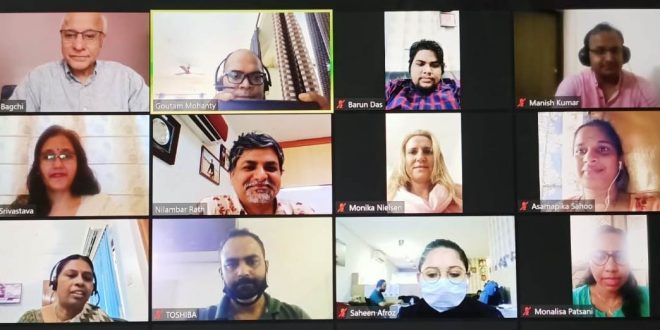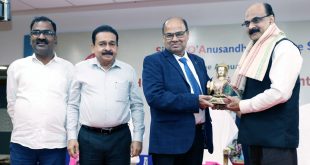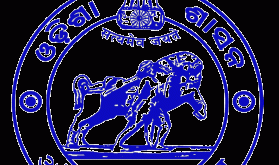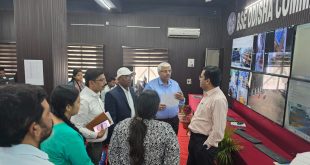Bhubaneswar: To deal with the stigma associated with COVID-19, UNICEF brought together experts and media in an orientation session on Tuesday.
The orientation was led by Odisha government chief spokesperson on COVID-19 Subroto Bagchi who along with UNICEF Odisha, Chief of Field Office Monika Nielsen among others addressed the media through an online webinar.
A former patient of COVID 19 who has recovered now was also present to share his experience in the session.
Setting the context, Monika Nielsen said, “Our team has been working closely with the government on minimizing the spread and impact of COVID 19 outbreak on the population especially on women and children and ensuring essential services were accessible during and after the pandemic.”
She added, “The priority area from the very beginning of the COVID 19 response has been risk communication and community engagement to help people minimize their personal risk, share information and remove stigma and discrimination.”
Stigma related to COVID 19 is fast becoming an obstacle in the fight against the disease. Healthcare workers, nurses, doctors, sanitation workers, ASHA, Anganwadi worker, ANM, Sarpanch and even doctors at times face stigma as they serve patients from the frontlines of the COVID 19 response.
The Government of Odisha has taken several measures including strict action against anyone who stigmatised or discriminated against any functionary working on COVID 19 response.
With a large number of migrant workers returning from different states to Odisha, it is important to ensure they are welcomed and are not stigmatised.
The government has been implementing an awareness drive on this subject emphasising on the need to the fight the disease and not the patient.
Speaking on aspects of stigma, Subroto Bagchi said, “If you look at the history of the word stigma it is associated with disgrace. The question is who are the people who get stigmatized. In any kind of human crisis people who are stigmatized are people who are vulnerable and the most vulnerable are women and children.
In addition, religious groups, people who are sick with contagious diseases and in the current times the displaced people or refugees are vulnerable to stigma. There is also the risk of unintended stigmatization. Hence the role of communication becomes extremely important to address the stigmas and stigmatization.”
Exemplifying risk of unintended stigmatization he pointed out use of term like `Surat Returnee’ to refer to a migrant worker which shifted the focus from the disease.
He spoke of the positive role played by the media in Odisha and urged journalist to be cautious in their reporting as most people took the printed word to be the final truth.
He said, “The media should ensure every story is verified especially if there are large repercussions. Balanced reporting, giving the opposite side an equal opportunity to state their views is necessary. Also, journalists should try and include the larger perspective in their reports and ensure the headlines capture the story well. As often, people only read the headline and not the rest of the article.”
He also urged the media to focus on the vulnerable as they face more hardship during any crisis.
Terming it a `war’ that had not been won yet, he asked all stakeholders to join forces together as the pandemic could impact anyone.
Sharing his experience of and feelings after being tested positive, a former patient who is totally cured now said, “It was painful to see people gossip about me in a disrespectful manner. When I was sick, I was very disturbed to read a lot of negative things written about me on social media. On the advice of my doctor, I stopped reading news for a few days as my anxiety levels were very high.”
This speaker said, “It is most important for people to show compassion towards a patient. This is not the time to blame anyone. Everyone had a role to play. I have suffered but I would not like to see any other patient suffer stigma.”
He urged everyone to focus on prevention and obey the rules of social distancing, mandatory wearing of mask, hand washing and all.
Speaking on the medical perspective of COVID 19, Dr. Meena Som, Health Specialist, UNICEF spoke about most cases being mild and the need to avoid too much focus on numbers or comparisons with other countries.
Lopamudra Tripathy, Communication Specialist, UNICEF spoke of the need to focus on positive news so that fear turns to hope and stigma is minimized.
She said anyone could a potential COVID target and anyone could be a COVID warrior. There is a need to celebrate the contribution of everyone who is contributing to the fight against COVID.
The meeting was moderated by Radhika Srivastava, Communication, Advocacy and Partnership Specialist, UNICEF.
 Update Odisha-Latest Odisha News I Breaking News Get latest news on Odisha, Govt. Jobs, OSSC, OPSC, Entertainment, Crime, Sports, and Education
Update Odisha-Latest Odisha News I Breaking News Get latest news on Odisha, Govt. Jobs, OSSC, OPSC, Entertainment, Crime, Sports, and Education



